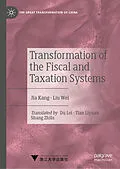This book elucidates the murky realities of China's taxation system today, and advocates bold plans for change. Theorizing finance and taxation in relation to a national political system, the authors explain the current tangled-up realities of China's creaky, inherited and uneven tax system- and put forward a plan for radical change. This book will be of interest to finance professionals, economists, and scholars of the Chinese economy. The focus is to properly handle the three basic economic and social relations between the government and the market (and the enterprises as the main market entities), between the central and local governments, and between the public power system and the citizens. This book follows the research context of problem orientation - goal orientation - practical operation, and puts forward the ideas, basic goals and paths of fiscal system reform that adapt to the modernization of national governance.
Jia Kang is Ph.D. Advisor and Research Fellow at Chinese Academy of Fiscal Sciences. He is a member of the National Committee of CPPCC and Member of Subcommittee of Economy, CPPCC. His has extensively published monographs and chapters such as New Supply: Chinese Innovation in Theory of Economics, Supply-Side Reform - China New Supply-Side Economics, Ten Topics of Supply-Side Reform, and Crucial Challenge in front of China: How to Escape Mid-income Trap.
Liu Wei has a Ph.D. in Economics and is Associate Research Fellow and Graduate Instructor at Chinese Academy of Fiscal Sciences (originally, Research Institute for Fiscal Science, the Ministry of Finance, P.R.C.). He is also Adjunct Professor of East China University of Political Science and Law and is mainly engaged in the research of financial theory and policies, government investment and financing, government budget performance.
Autorentext
Jia Kang is Ph.D. Advisor and Research Fellow at Chinese Academy of Fiscal Sciences. He is a member of the National Committee of CPPCC and Member of Subcommittee of Economy, CPPCC. His has extensively published monographs and chapters such as New Supply: Chinese Innovation in Theory of Economics, Supply-Side Reform - China New Supply-Side Economics, Ten Topics of Supply-Side Reform, and Crucial Challenge in front of China: How to Escape Mid-income Trap.
Liu Wei has a Ph.D. in Economics and is Associate Research Fellow and Graduate Instructor at Chinese Academy of Fiscal Sciences (originally, Research Institute for Fiscal Science, the Ministry of Finance, P.R.C.). He is also Adjunct Professor of East China University of Political Science and Law and is mainly engaged in the research of financial theory and policies, government investment and financing, government budget performance.
Inhalt
Introduction The Reform of the Fiscal System Intended to Promote Inclusive Growth and Comprehensive Reforms: Background and Perspectives
1. New Era of China's Pursuit to Realize its Strategic Modernization Goals: New Challenges and Inevitable Comprehensive Reforms
2. Reflection on Linking Inclusive Growth with Strategic Modernization Goals and the Way Forward
3. Support of public finance to overall reform: review and expectation
4. International practice and learning of China of tax-sharing system
Chapter I Problem-oriented: major problems the fiscal and taxation system of China confronts
1. Problems to be solved existing in current tax-sharing system of China
2. Insufficient management system support demanded by policy optimization and performance promotion
3. Sustainable problems of finance
4. Analysis of the resistance and obstacle factors of reform
Chapter II Target-directed: overall thinking, basic targets and routes of fiscal and taxation system reform
1. Overall thinking
2. Basic targets
3. Routes
Chapter III Practical operation: build modern fiscal and taxation system adapted to the modernization of national governance
1. Establish scientific and normative inter-governmental fiscal distribution relations
2. Perfect budget control system and complete government budget management system
3. Thoroughly enhance tax reform and accelerate the establishment of complete local tax system
4. Further enhance the reform of fiscal expenditure management
5. Perfect government debt management system
Chapter IV Risk prevention and control and supporting linkage
1. Evaluation of basic condition of fiscal risk
2. Framework and essentials of fiscal risk prevention system
3. Coordinated promotion of fiscal and taxation reform and other reforms
References
Epilogue
